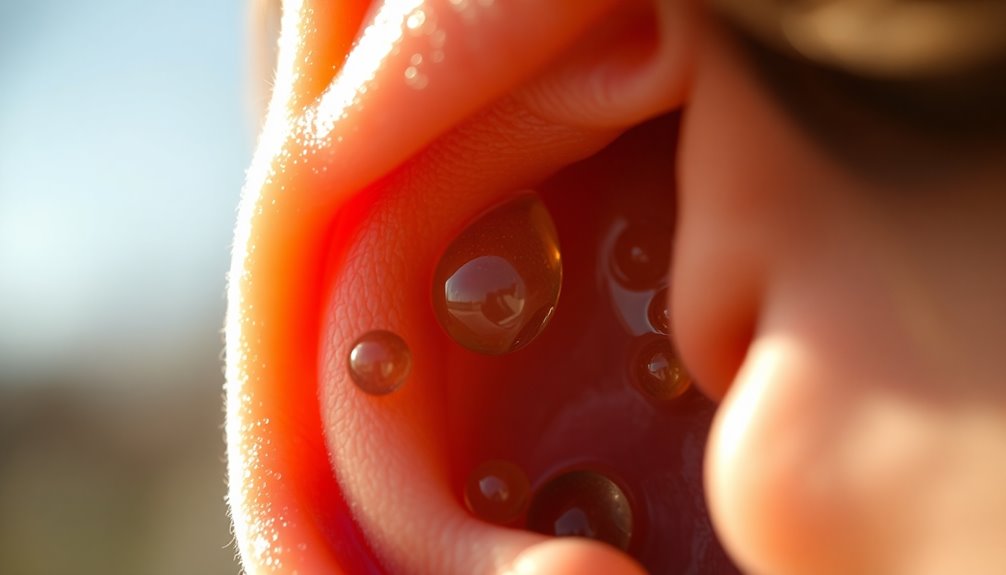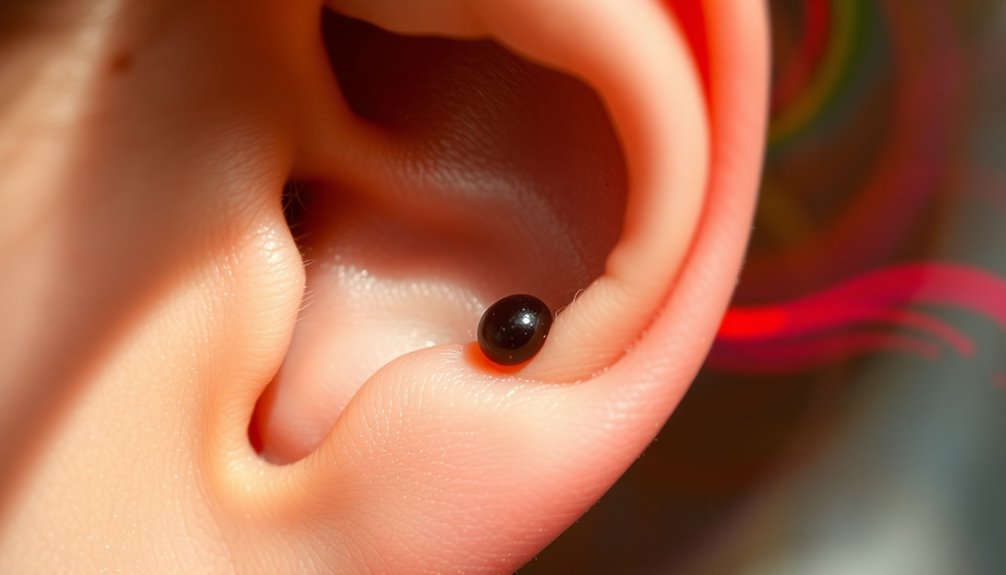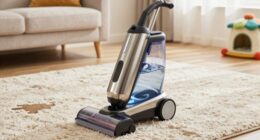Your earwax is likely wet in the morning due to increased production that happens overnight. This wetness usually stems from your genetic makeup and environmental factors, leading to a higher lipid content in your earwax. The sebaceous glands produce sebum along with dead skin cells, making it moist. Additionally, humidity can further impact the consistency of your earwax. Remember, earwax plays a protective role, trapping dust and debris. If you're curious about ear care practices or when to consult a doctor, there's more information that can help you understand more about your ear health.
Key Takeaways
- Wet earwax is often due to increased production overnight, primarily influenced by genetic factors.
- Higher lipid content in wet earwax results from sebum and dead skin cells from sebaceous glands.
- Environmental humidity can affect the consistency and moisture levels of earwax.
- The wetness serves as a protective mechanism, trapping dust and debris in the ear canal.
- Regular ear care practices help manage earwax, but excessive cleaning can lead to increased production.
Understanding Earwax Composition
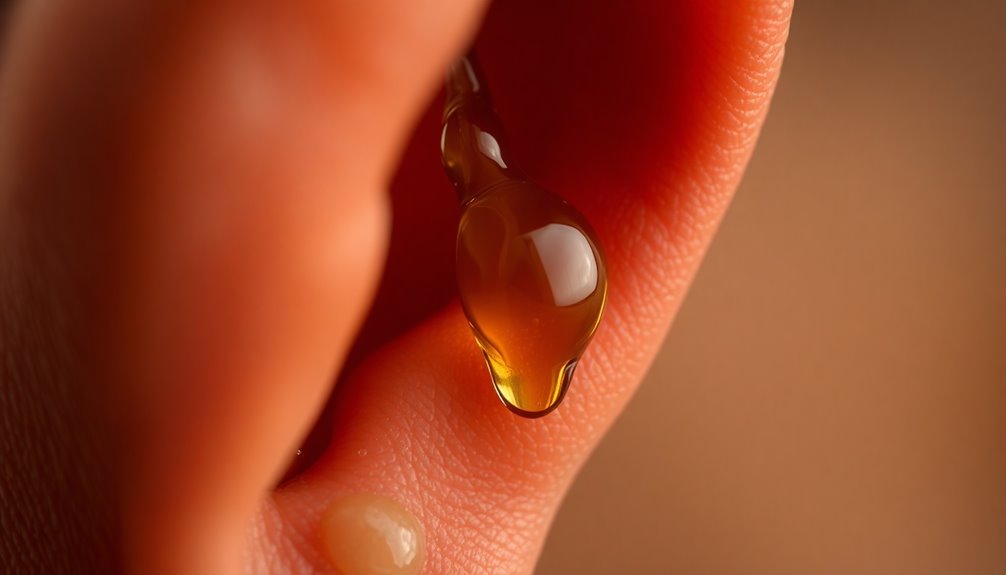
Earwax, or cerumen, plays an essential role in ear health, and understanding its composition can help you appreciate its functions. The primary components of earwax include sebum, dead skin cells, and various organic materials. This mixture varies in consistency based on individual genetics and environment. For instance, you might notice that your earwax is wet, which indicates a higher lipid content, while others may have dry earwax, commonly found in those of East Asian descent.
The composition of earwax serves as a natural defense mechanism. It traps dust, debris, and microorganisms, protecting your ear canal from potential harm. Additionally, earwax has antibacterial and antifungal properties, further helping to ward off ear infections. As earwax ages, it can darken and thicken, showcasing its ongoing role in safeguarding your ears over time.
Moreover, the natural composition of earwax aids in maintaining moisture in the ear canal, preventing dryness. This moisture is essential in reducing the risk of ear infections, ensuring your ears remain healthy and functioning effectively.
Understanding these elements allows you to recognize the significant functions earwax performs for your overall ear health.
Causes of Wet Earwax
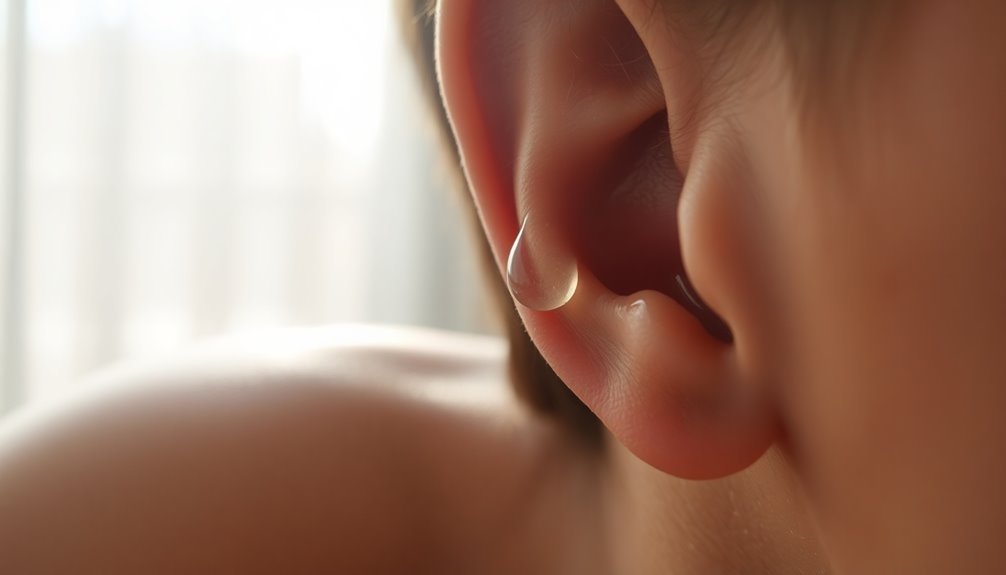
Wet earwax, often resulting from genetic factors, is mainly seen in individuals of European and African descent. This type of cerumen is primarily composed of sebum and dead skin cells. The moisture in your earwax comes from sebaceous glands that secrete an oily substance, helping to lubricate your ear canal and prevent dryness.
You might notice increased earwax production overnight, as your body continues to produce cerumen while at rest. This natural phenomenon can lead to the sensation of wetness in the morning.
Environmental conditions, such as humidity, can also influence the consistency and moisture level of your earwax. Additionally, your individual ear canal shape plays a role in how earwax behaves.
Wet earwax serves as a protective mechanism, trapping dust and debris that could enter your ear canal. Its antimicrobial properties help reduce the risk of infections, keeping your ears healthy.
Understanding these causes of wet earwax can help you better appreciate the role it plays in your ear health and why you might find it more noticeable in the morning.
Ear Care Practices
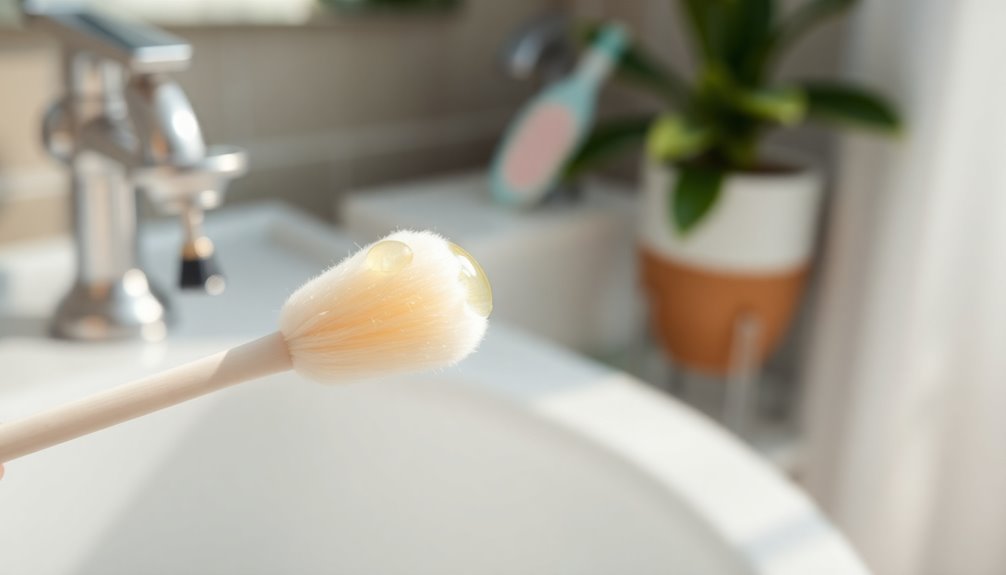
Maintaining proper ear care practices is essential for preventing issues related to earwax buildup and ensuring overall ear health. You should remember that earwax, or cerumen, acts as a natural barrier against dirt and bacteria. The outer ear can be cleaned regularly with soap and water, while the ear canal self-cleans, so invasive methods are unnecessary.
| Ear Care Practice | Benefits |
|---|---|
| Regular Ear Cleaning | Removes dirt; maintains ear hygiene |
| Avoiding Cotton Swabs | Prevents pushing wax deeper, avoiding impaction |
| Using Ear Drops (with care) | Softens excess earwax; consult a healthcare provider first |
If you experience excess earwax, consider using over-the-counter ear drops, but always consult a healthcare provider beforehand. Avoiding cotton swabs is critical, as they can cause more harm than good. Remember, improper ear care can lead to hearing loss or other complications. Keeping your ears healthy is a simple yet important practice that can prevent discomfort and promote better hearing. Stay mindful of how you care for your ears!
When to Consult a Doctor
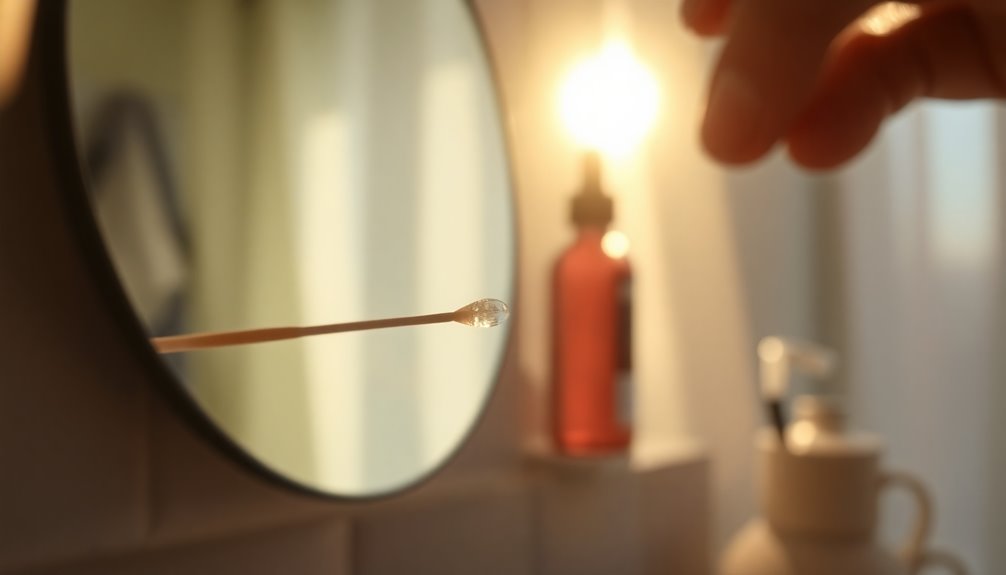
Knowing when to consult a doctor is important for addressing potential earwax-related issues effectively. If you experience symptoms like ear fullness, ear pain, or significant hearing loss, it's essential to seek medical advice. These signs can indicate earwax buildup or other underlying problems that need attention.
A persistent wet sensation in your ear, especially if accompanied by discomfort or unusual discharge, should prompt a visit to your healthcare provider. This can help rule out infections or complications affecting your inner or outer ear.
If you wear hearing aids and notice that excessive earwax is impacting their effectiveness, don't hesitate to consult a doctor or audiologist for tailored earwax removal solutions.
Additionally, if you have a history of ear issues, regular check-ups are critical to monitor earwax accumulation and maintain ideal ear health. Early detection, similar to the approach taken in mammography guidelines, can significantly improve treatment outcomes.
You should seek immediate medical attention if you notice blood or pus draining from your ear, as this could signal a serious condition that requires prompt intervention. Being proactive about your ear health will help you address any issues before they escalate.
Myths About Earwax
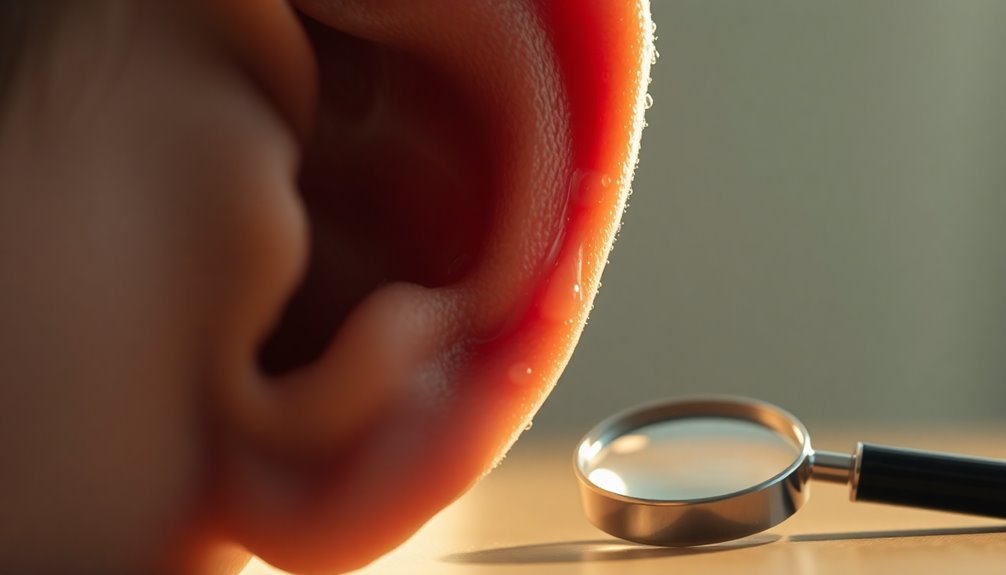
Many misconceptions surround earwax, leading to confusion about its role and management.
It's crucial to understand that earwax isn't just a nuisance; it serves important protective functions for your ear health.
Here are some myths you might've heard:
- Earwax is harmful and must always be removed: In reality, earwax traps dirt and bacteria, maintaining a clean environment in your ear canals.
- Cotton swabs are effective for cleaning ears: Using them can push wax deeper, causing more buildup and potential impaction.
- The color of earwax indicates health: Earwax varies from off-white to dark brown, which is normal and can change with age and moisture exposure.
- Earwax signifies poor hygiene: This misconception overlooks that earwax is a natural substance produced for protection and self-cleaning.
Excessive cleaning can lead to more earwax production, not less.
Understanding these myths can help you manage your ear health better, avoiding unnecessary practices that might cause more harm than good.
Frequently Asked Questions
Why Did I Wake up With Wet Earwax?
You might wake up with wet earwax due to your body's natural processes during the night.
As you sleep, your ears produce cerumen, which helps trap debris and keeps your ear healthy. Movements like chewing or talking can expel excess wax, leading to moisture accumulation. This can be completely normal, indicating your ears are functioning well.
However, if you experience pain or hearing loss, it's best to consult a healthcare professional for advice.
Why Do My Ears Leak Wax in the Morning?
Did you know that about 60% of people have wet earwax?
If you're waking up to leaking wax, it's likely due to your body's natural process of producing cerumen overnight. The moisture in earwax traps dirt and debris, making it more noticeable when your ears are less active while you sleep.
Jaw movements during the night can also push wax outward.
If you're experiencing pain or hearing loss, consider seeing a healthcare professional.
Why Do I Have Fluid in My Ear in the Morning?
You might notice fluid in your ear in the morning due to the natural buildup of earwax overnight.
While you sleep, moisture and debris can accumulate, making the wax feel wetter.
Temperature changes or humidity can also soften the earwax, altering its consistency.
If you wear hearing aids, that might contribute to the sensation, as they can prevent proper earwax expulsion.
If you experience pain or hearing loss, consider consulting a doctor.
Why Is There Sudden Wetness in My Ear?
Oh great, you've got a mini pond in your ear! That sudden wetness could be your body's way of reminding you it's still working hard overnight.
Your earwax is just doing its job, migrating to the outer ear like it's on a little adventure. Factors like your sleeping position or even jaw movement can stir things up.
If it's not painful or affecting your hearing, you're probably just fine!
Conclusion
In the morning, your wet earwax might symbolize the night's whispers of your body's natural rhythms. Just as the dew clings to grass at dawn, your earwax captures moisture, reflecting your unique health. Embrace this natural process and treat your ears with care, like a gardener tending to delicate blooms. If concerns linger, don't hesitate to consult a doctor. Remember, your body communicates—listen closely, and you'll find clarity in the symphony of your well-being.
